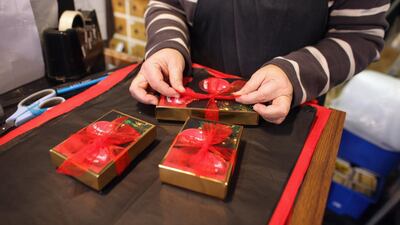Here’s a seasonal story about gift-giving and receiving. A British woman reported on social media that for more than a decade, her husband had given a neighbour a Christmas present of a few bottles of an alcoholic beverage. The neighbour responded with a gift of chocolates.
The neighbours politely went through this December ritual for years until they eventually discovered the embarrassing truth. The man who received the bottles does not drink alcohol. The man who received the sweets does not eat chocolate. Both had accepted the gifts with a smile and a thank you and were too polite to mention that the presents were entirely wrong for the recipient.
I laughed, but also winced at this story. My own record of gift-giving and receiving, especially at Christmas, is a mess. For most of my adult life, the gifts I have given have often turned out to be inappropriate in some way, the wrong size, the wrong style, the wrong colour, the wrong fabric or (and this is a real horror) on one occasion identical to the gift I gave a year before.
A friend told me the medical name for this condition is called “being a man”. But the alcohol-chocolate story touched me in another way. It is a tale of how we project onto other people what we consider to be normal. Some people think drinking alcohol is normal, while for others, it is something they would never do. Some believe that the whole world loves chocolate and for them, the idea that other people refuse to eat sweets or confectionery can seem very abnormal indeed.
I should know because here is an embarrassing Yuletide confession: I really, really do not like chocolate. I cannot honestly remember the last time I ate it. But, like the gift-giving neighbours, when I receive chocolate as a gift, as happens fairly often, I smile and say “thank you” out of politeness (or cowardice) and then hand the gift over to one of my many chocaholic friends at the first opportunity.
Being choco-phobic can be extremely awkward, especially when the gift giver actually expects that the lovely chocolate delicacies should be eaten straight away. In such circumstances, I usually find some polite excuse to decline, but this has often resulted in the immediate response: “Oh, you are on a diet?” No. On a few occasions, I have even been asked (very sympathetically) if I am diabetic (thankfully, no to that also).
But the worst moment for my secret life as a choco-phobe came from a former work colleague. Her husband worked for a prestigious chocolate firm in Perugia and she often brought samples of his delights to the office. I always politely declined, but she persisted. One day, I made the mistake of telling her the honest truth.
______________
Read more from Opinion
In lifting the cinema ban, Saudi Arabia gives voice to people's stories
The US president is all talk and no action when it comes to issues like Jerusalem
Are you addicted to social media? Here's how to check
______________
“I don’t like chocolate.” Her face suggested I had just confessed to being a serial killer or an alien invader from Mars. “You don’t like chocolate? Why not?”
I was trapped into a full confession. “I … I just don’t like it.” “So what sweets do you like?” she asked. “I don’t really eat sweets.” My colleague shook her head, utterly dumbfounded. “Cakes?” she suggested, desperately searching for some sign that I was human after all.
“Not really.”
On another occasion on a visit to Lebanon, my wife and I spent time with a friend in Beirut who took us to his family's home in the mountains. He alerted his mother that I did not eat sweet foods or chocolate. She simply did not believe him, because everybody – everybody – loves sweets and chocolate. What followed was like the scene from the movie My Big Fat Greek Wedding, in which the Greek bride takes her boyfriend to meet her family and explains that he is a vegetarian, and therefore does not eat meat.
“No problem,” the Greek mother says. “I cook lamb.”
My friend’s very hospitable Lebanese mother put an array of wonderful homemade pastries in front of me and since I suffer from social cowardice in such situations, I ate what I could, smiled a lot and offered thanks. The alternative was for her to conclude her son had befriended some wide-eyed chocolate-and-baklava-hating lunatic.
Of course, hospitality and gift-giving are important less for the food or the material gifts than for the symbolic expression of the love of friends, families and good neighbours. And even if my peculiar dislike of sweets and chocolate can be socially awkward and embarrassing, there are some good points.
My wife travels a great deal for work. She once told me that one big plus in our relationship is that when she puts chocolate in the fridge, she knows that when she returns home, it will still be there, intact, uneaten, untouched. If a chocolate-lover and a chocolate-loather can co-exist, then perhaps it is possible to bridge other apparently irreconcilable differences. Now that would be a truly great gift for the new year ahead.


